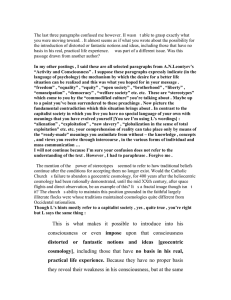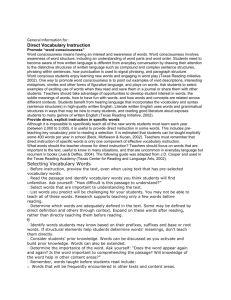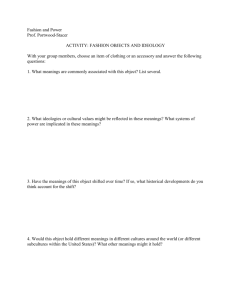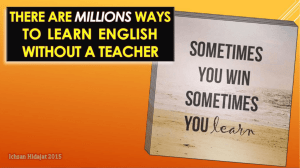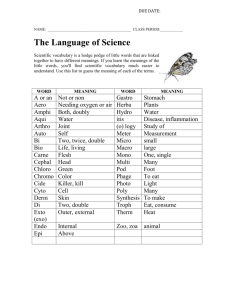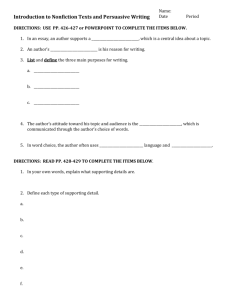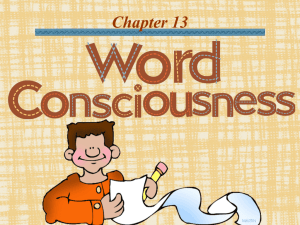Vocabulary Acquisition for Young Children
advertisement
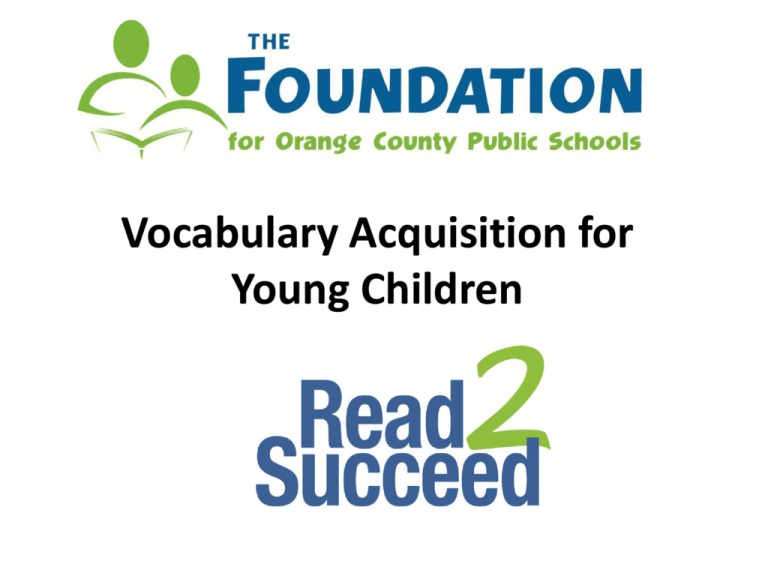
Vocabulary Acquisition for Young Children Research on Vocabulary • Research shows there is a great disparity of vocabulary acquisition based mainly on economic circumstances. Children enter school with "meaningful differences" in vocabulary knowledge. • Race, ethnicity, gender and birth order do not seem to be an indicator of vocabulary knowledge but what does seem to matter is relative economic advantage3. Emergence of the Problem In a typical hour, the average child hears: Family Status Actual Differences in Quantity of Words Heard Actual Differences in Quality of Words Heard Welfare 616 words 5 affirmations, 11 prohibitions Working Class 1,251 words 12 affirmations, 7 prohibitions Professional 2,153 words 32 affirmations, 5 prohibitions Cumulative Vocabulary Experiences Family Status Words heard per hour Words heard in a 100hour week Words heard in a 5,200 hour year Words heard in 4 years Welfare 616 62,000 3 million 13 million Working Class 1,251 125,000 6 million 26 million Professional 2,153 215,000 11 million 45 million Meaningful Differences Cumulative Vocabulary Children from welfare families: 500 words Children from working class families: 700 words Children from professional families: 1,100 words References 1Hart, B., & Risley, R. T. (1995). Meaningful differences in the everyday experience of young American children. Baltimore: Paul H. Brookes. What is Vocabulary? • Vocabulary refers to the words we must know to communicate effectively. In general, it can be described as oral vocabulary or reading vocabulary. Oral vocabulary refers to words that we use in speaking or recognize in listening. Reading vocabulary refers to words we recognize or use in print. Roleof ofVocabulary Vocabulary Role • Vocabulary plays an important part in learning to read. As beginning readers, children use the words they have heard to make sense of the words they see in print. Example…Dig-familiar, recognizes that the sounds make up a very familiar word that she has heard and said many times. Beginning readers have a much more difficult time reading words that are not already part of their oral vocabulary. Vocabulary Vocabulary(continued) (continued) • Vocabulary also is very important to reading comprehension. – Readers cannot understand what they are reading without knowing what most of the words mean. – As children learn to read more advanced texts, they must learn the meaning of new words that are not part of their oral vocabulary. Research Researchon onVocabulary VocabularyInstruction Instruction • What does scientifically based research tell us about vocabulary instruction? Most vocabulary is learned indirectly Some vocabulary must be taught directly. Four Types Types of of Vocabulary Vocabulary Four Researchers often refer to four types of vocabulary • listening vocabulary—the words we need to know to understand what we hear. • speaking vocabulary—the words we use when we speak. • reading vocabulary—the words we need to know to understand what we read. • writing vocabulary—the words we use in writing. How Children Learn Meanings Children learn the meanings of most words indirectly, through everyday experiences with oral and written language. • They engage daily in oral language. • They listen to adults read to them. • They read extensively on their own. Learned Vocabulary: Direct vs. Learned Vocabulary: Direct vs. Indirect Indirect • Direct instruction helps students learn difficult words, such as words that represent complex concepts that are not part of the students’ everyday experiences. Direct instruction of vocabulary relevant to a given text leads to better reading comprehension. • Direct instruction includes: – providing students with specific word instruction; and – teaching students word-learning strategies. How Children Children Can Can Learn Learn Indirectly Indirectly How Question: How can I help children learn words indirectly? Read to children out loud Have children read independently outside the classroom Question: What words should I teach? – Important words. Useful words. Difficult words. Words with multiple meanings are particularly challenging for students. IndirectLearning Learning(continued) (continued) Indirect • Difficult words Idiomatic expressions also can be difficult for students, especially for students who are English language learners. Examples: “hard hearted,“ “a chip off the old block,“ “drawing a blank,“ or “get the picture.“ Word WordKnowledge Knowledge Question: How well do children need to “know” vocabulary words? • Students do not either know or not know words. Rather, they know words to varying degrees. • These three levels of word knowledge are called unknown, acquainted, and established. Same Spelling, spelling, Different Meanings • sow (a female pig); sow (to plant seeds) • bow (a knot with loops); bow (the front of a ship) • mail (letters, cards, and packages); • mail (a type of armor) • ray (a narrow beam of light); • ray (a type of fish); ray (part of a line) LearningWords words in in Other other Subjects subjects Learning • Learning words and concepts in science, social studies, and mathematics is even more challenging because each major concept often is associated with many other new concepts. Example: the concept of deserts is often associated with other concepts that may be unfamiliar, such as cactus, plateau, and mesa. Word WordConsciousness Consciousness • Help students foster word consciousness—an awareness of and interest in words, their meanings, and their power. • Word-conscious students know many words and use them well. They enjoy words and are eager to learn new words—and they know how to learn them. Ways to Foster Foster Word Word Consciousness Consciousness • You can help your students develop word consciousness in several ways. Call their attention to the way authors choose words to convey particular meanings. Encourage students to play with words by engaging in word play, such as puns or palindromes. Help them research a word’s origin or history. You can also encourage them to search for examples of a word’s usage in their everyday lives. Thank you for all you do! Our students are so fortunate to have you in their lives.
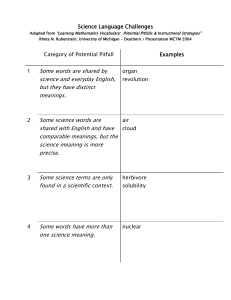

![Word Study [1 class hour]](http://s3.studylib.net/store/data/007905774_2-53b71d303720cf6608aea934a43e9f05-300x300.png)
